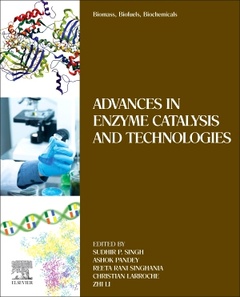Biomass, Biofuels, Biochemicals Advances in Enzyme Catalysis and Technologies
Coordonnateurs : Singh Sudhir P., Pandey Ashok, Singhania Reeta Rani, Larroche Christian, Li Zhi

Advances in Enzyme Catalysis and Technologies intends to provide the basic structural and functional descriptions, and classification of enzymes. The scientific information related to the recombinant enzyme modifications, discovery of novel enzymes and development of synthetic enzymes are also presented. The translational aspects of enzyme catalysis and bioprocess technologies are illustrated, by emphasizing the current requirements and future perspectives of industrial biotechnology. Several case studies are included on enzymes for biofuels application, micro algal biorefineries, high-value bioactive molecules production and enzymes for environmental processes, such as enzymatic bioprocessing for functional food development, biocatalytic technologies for the production of functional sweetener, etc.
1. An introduction to enzyme-structure dynamics and enzyme-catalysis 2. Classification of enzymes and catalytic properties 3. An overview of enzymes and their production strategies 4. Robust enzymes designing for efficient bio-catalysis 5. Enzyme engineering strategies to confer thermal stability 6. Enzyme engineering strategies for catalytic activity in wide pH range 7. Protein Engineering approaches for enhanced catalytic efficiency 8. Chimeric enzyme designing for the synthesis of multi-functional biocatalysts 9. Enzyme engineering for enantioselective biotransformations 10. Nanobiocatalyst designing strategies and their applications in food industry 11. Enzyme entrapment approaches and their applications 12. Enzyme immobilization strategies and bioprocessing applications 13. Promising enzymes for biomass processing 14. Enzyme systems for high-value biomolecule production 15. Enzymatic bioprocessing for functional food development 16. Biotransformations with crude enzymes and whole cells 17. Enzymes in the Third Generation Biorefinery for Macroalgae Biomass 18. Enzymatic systems to develop juice-clarification strategies 19. Biocatalyst systems for xylooligosaccharide production from biomass, and its uses 20. Biocatalysis for cascade reactions to produce high value chemicals
Graduate and post-graduate students, doctoral fellows, researchers, mentors, scientists, teachers, and trainees in biocatalysis, biochemical engineering, and biochemistry
Professor Ashok Pandey is currently Distinguished Scientist at the Centre for Innovation and Translational Research, CSIR-Indi
- Provides a conceptual understanding of enzyme catalysis, enzyme engineering, discovery of novel enzymes, and technology perspectives
- Includes comprehensive information about the inventions and advancement in enzyme system development for biomass processing and functional food developmental aspects
- Gives an updated reference for education and understanding of enzyme technology
Date de parution : 04-2020
Ouvrage de 472 p.
19x23.3 cm



